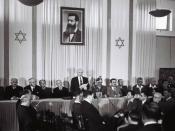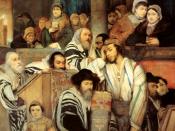"[She] starts to sort it out, to turn over the day, scraps, feelings, words and laughter, all are like a thin layer of rubbish that [she] gathers up and throws into the basket" (9). In A.B. Yehoshua's novel The Lover, Asya utilizes dreams to release her inner-tensions. Yehoshua employs Asya's dreams as symbolic, prophetic mechanisms that parallel the subtle, emotional conflicts within the characters and her self.
Once Asya is deprived of her lover, Gabriel, she is consumed by his absence and immediately begins to dream about him. The first of Asya's dreams described in the novel reflects her unconscious desire to reunite with Gabriel and abandon her family. The dream places Asya within a military encampment as an educator on a fieldtrip, paralleling Gabriel's own military excursion (14). Like the dreamer, the reader is also unable to make the connection between the dream and Gabriel, because both are uncertain of Gabriel's military career at the novel's onset.
"The faces of children from Dafi's class" that Asya encounters are analogous to the "young, boyish faced" men in Gabriel's platoon (14, 297). While Dafi's class attends compulsory education, the soldiers have been forced into military service. Dafi's class also creates a commentary on the Zionist movement. Though the Zionist movement recently catalyzed the creation of an Israeli state, the Israeli's must now defend their independence in the Yom Kippur War. The field trip in Asya's dream exposes the young children to war, corrupting their naivety and innocence. These children must be prepared; they must sacrifice their childhoods for war, because most Israelis believe their independence will continually be contested, regardless of the outcome of the Yom Kippur War.
Like Gabriel, Asya is lost within the encampment; she does not understand her purpose, but eventually understands her position with the...


